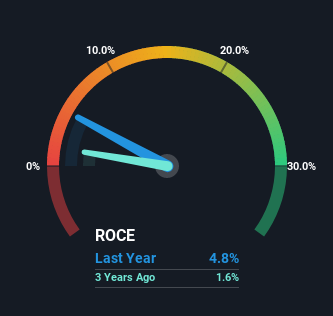- United States
- /
- Auto Components
- /
- NasdaqCM:CAAS
Here's What To Make Of China Automotive Systems' (NASDAQ:CAAS) Decelerating Rates Of Return
What are the early trends we should look for to identify a stock that could multiply in value over the long term? Typically, we'll want to notice a trend of growing return on capital employed (ROCE) and alongside that, an expanding base of capital employed. Put simply, these types of businesses are compounding machines, meaning they are continually reinvesting their earnings at ever-higher rates of return. However, after briefly looking over the numbers, we don't think China Automotive Systems (NASDAQ:CAAS) has the makings of a multi-bagger going forward, but let's have a look at why that may be.
Return On Capital Employed (ROCE): What Is It?
If you haven't worked with ROCE before, it measures the 'return' (pre-tax profit) a company generates from capital employed in its business. Analysts use this formula to calculate it for China Automotive Systems:
Return on Capital Employed = Earnings Before Interest and Tax (EBIT) ÷ (Total Assets - Current Liabilities)
0.048 = US$17m ÷ (US$727m - US$364m) (Based on the trailing twelve months to March 2023).
Thus, China Automotive Systems has an ROCE of 4.8%. Ultimately, that's a low return and it under-performs the Auto Components industry average of 11%.
Check out our latest analysis for China Automotive Systems

While the past is not representative of the future, it can be helpful to know how a company has performed historically, which is why we have this chart above. If you're interested in investigating China Automotive Systems' past further, check out this free graph of past earnings, revenue and cash flow.
So How Is China Automotive Systems' ROCE Trending?
Things have been pretty stable at China Automotive Systems, with its capital employed and returns on that capital staying somewhat the same for the last five years. It's not uncommon to see this when looking at a mature and stable business that isn't re-investing its earnings because it has likely passed that phase of the business cycle. With that in mind, unless investment picks up again in the future, we wouldn't expect China Automotive Systems to be a multi-bagger going forward.
Another thing to note, China Automotive Systems has a high ratio of current liabilities to total assets of 50%. This can bring about some risks because the company is basically operating with a rather large reliance on its suppliers or other sorts of short-term creditors. While it's not necessarily a bad thing, it can be beneficial if this ratio is lower.
The Bottom Line
In summary, China Automotive Systems isn't compounding its earnings but is generating stable returns on the same amount of capital employed. And investors may be recognizing these trends since the stock has only returned a total of 17% to shareholders over the last five years. Therefore, if you're looking for a multi-bagger, we'd propose looking at other options.
If you want to continue researching China Automotive Systems, you might be interested to know about the 1 warning sign that our analysis has discovered.
If you want to search for solid companies with great earnings, check out this free list of companies with good balance sheets and impressive returns on equity.
New: AI Stock Screener & Alerts
Our new AI Stock Screener scans the market every day to uncover opportunities.
• Dividend Powerhouses (3%+ Yield)
• Undervalued Small Caps with Insider Buying
• High growth Tech and AI Companies
Or build your own from over 50 metrics.
Have feedback on this article? Concerned about the content? Get in touch with us directly. Alternatively, email editorial-team (at) simplywallst.com.
This article by Simply Wall St is general in nature. We provide commentary based on historical data and analyst forecasts only using an unbiased methodology and our articles are not intended to be financial advice. It does not constitute a recommendation to buy or sell any stock, and does not take account of your objectives, or your financial situation. We aim to bring you long-term focused analysis driven by fundamental data. Note that our analysis may not factor in the latest price-sensitive company announcements or qualitative material. Simply Wall St has no position in any stocks mentioned.
About NasdaqCM:CAAS
China Automotive Systems
Through its subsidiaries, manufactures and sells automotive systems and components in the People’s Republic of China, the United States, and internationally.
Excellent balance sheet and good value.
Similar Companies
Market Insights
Community Narratives



